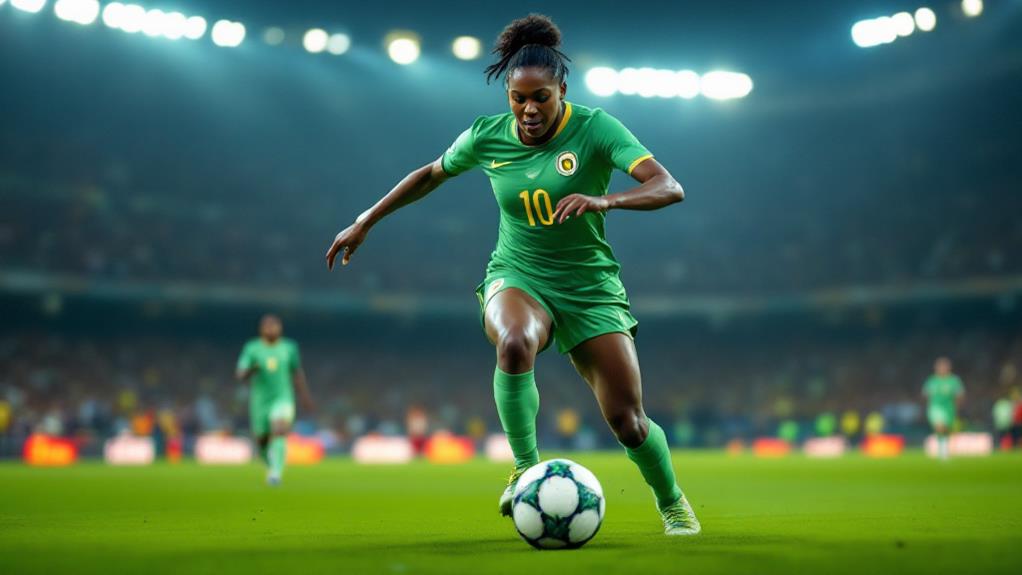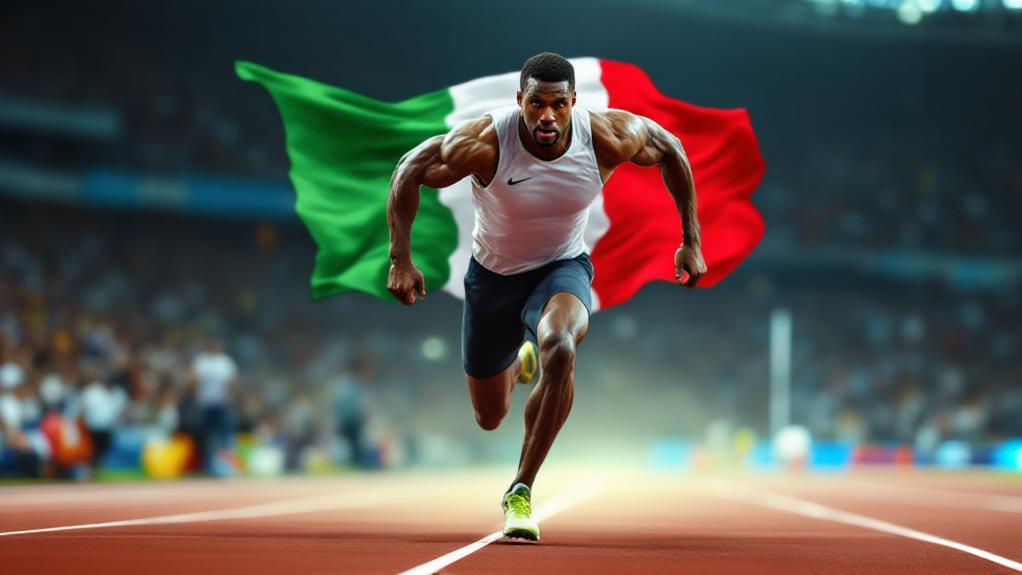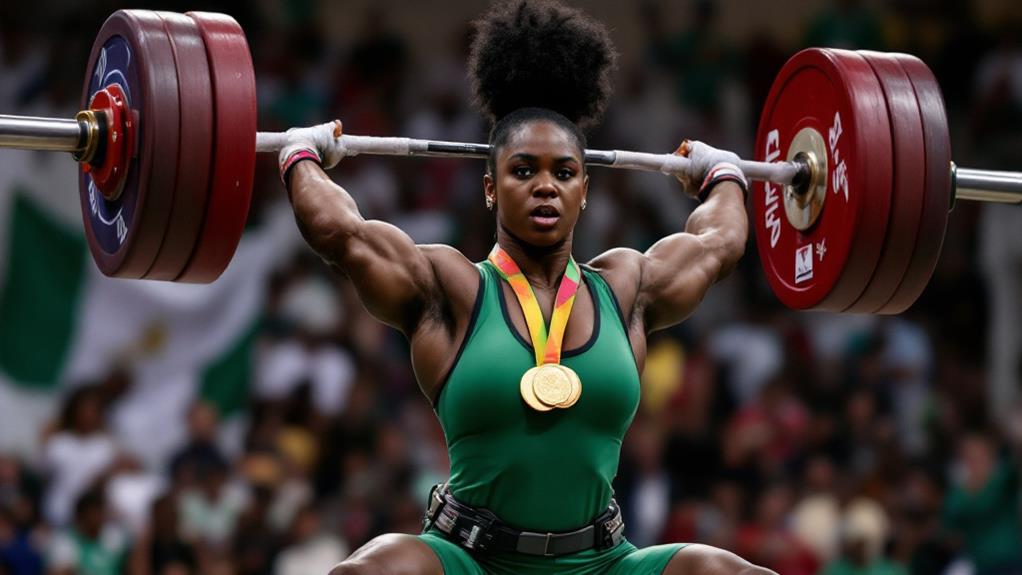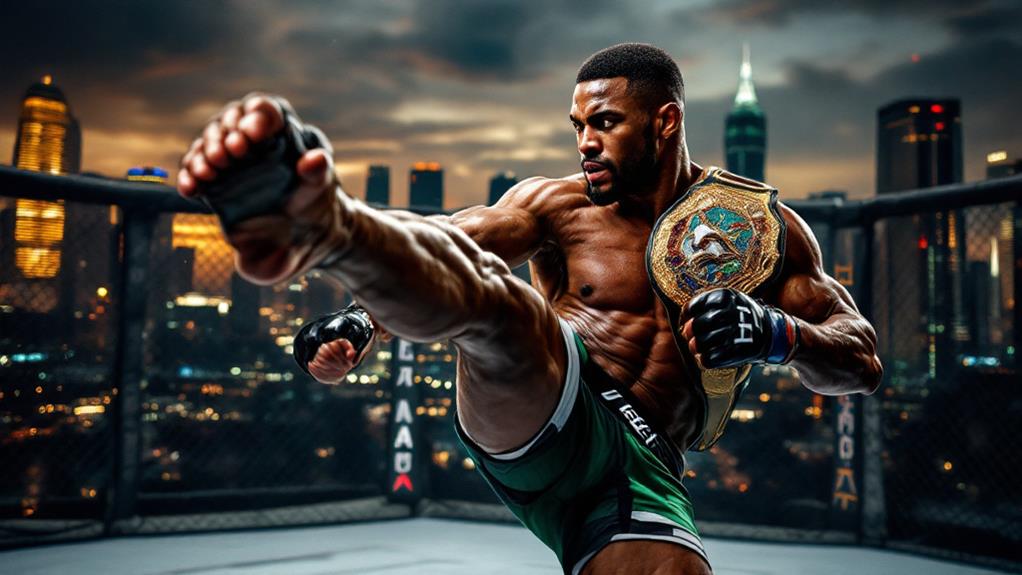Hogan Bassey: Nigeria's First World Boxing Champion
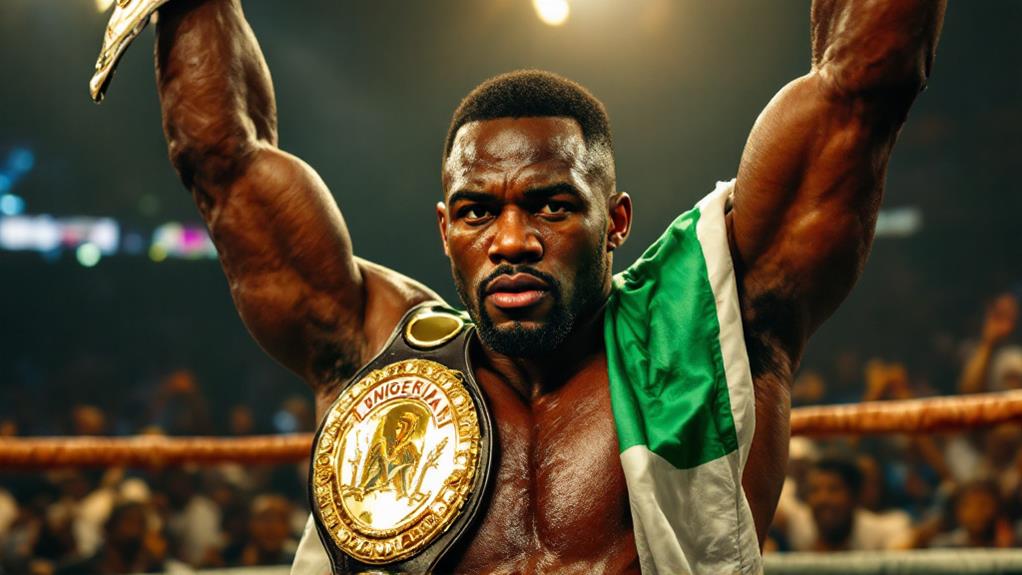
Hogan Bassey made history as Nigeria's first world boxing champion in 1957. Born in 1932 in Cross River State, he explored his passion for boxing early on. Bassey's expedition took him from Nigeria to Liverpool, England, where he honed his skills and climbed the ranks of British boxing. His powerful punches, technical prowess, and defensive skills propelled him to capture the World Featherweight title. Bassey's success inspired generations of Nigerian boxers and challenged perceptions within the British Empire. He later became a respected coach, nurturing young talent in his home country. Bassey's legacy extends far beyond his championship reign, shaping the future of Nigerian boxing.
Early Life in Nigeria
A young champion in the making, Hogan Bassey entered the world in 1932 in Nigeria's Cross River State. You'll find that his early years were marked by a passion for boxing that would shape his future. Born into a Nigerian family, Bassey grew up in a time when the country was still under British colonial rule, known as the British Empire.
As a young man, Bassey discovered his talent for boxing and began honing his skills. He didn't waste any time pursuing his dream, quickly transitioning from amateur to professional fights. His dedication to training paid off as he commenced his boxing career in Nigeria. You'd be impressed to know that Bassey competed in 14 contests while still in his home country, laying the foundation for his future success.
Bassey's early achievements in Nigeria caught the attention of boxing enthusiasts and promoters. His natural talent, combined with rigorous training, set him apart from his peers. Little did he know that his expedition as a boxer would soon take him far beyond the borders of Cross River State and Nigeria itself.
Journey to Liverpool
Hogan Bassey's boxing expedition took an international turn in 1951 when he set his sights on Liverpool, England. The born Nigerian boxer, who'd later become known as Hogan Kid Bassey, arrived in the vibrant port city just three days before Christmas. This move would prove critical in his quest to become a world boxing champion.
In Liverpool, Bassey found the perfect environment to hone his skills and launch his professional boxing career. He wasted no time, stepping into the ring for his first professional fight at the Liverpool Stadium in May 1956. The city quickly became his training ground, providing the foundation for his future success.
As Bassey climbed the ranks, he faced formidable opponents like Jean Sneyers and Ernesto Parra. His dedication and hard work in Liverpool paid off, leading him to capture the British Empire Featherweight title. This achievement was just a stepping stone on his path to becoming the first Nigerian-born world boxing champion. Liverpool's influence on Bassey's career can't be overstated, as it provided the platform for his rise to international boxing stardom.
Rise in British Boxing
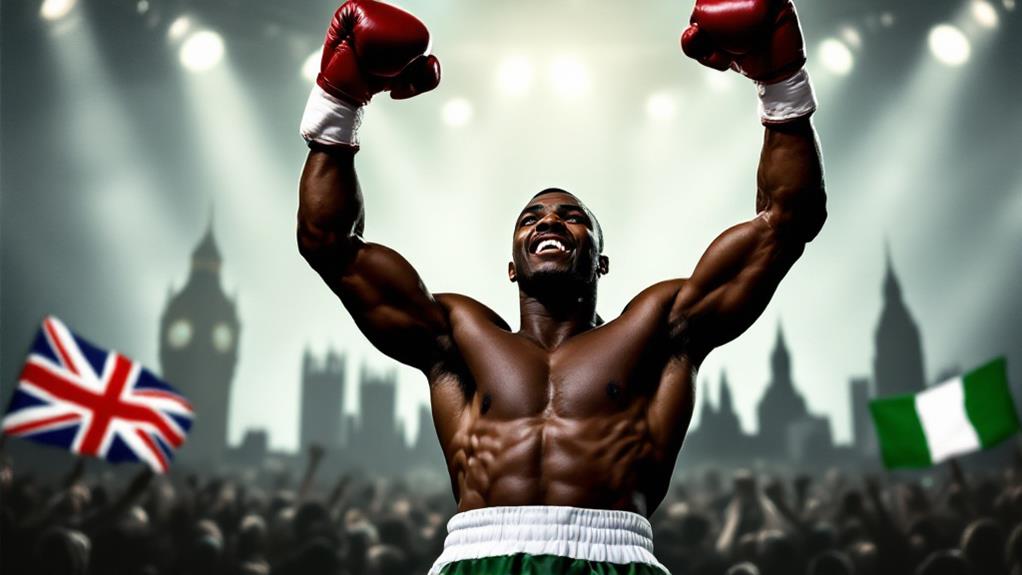
The rise of Hogan Bassey in British boxing circles during the 1950s marked a turning point for the sport in the UK. As you might imagine, his successful career in Liverpool played a critical role in boosting boxing's popularity across Britain. When Bassey stepped into the ring at Liverpool Stadium for his title wins and defenses, you'd see packed crowds and feel the electrifying atmosphere. The Nigerian-born featherweight champion's accomplishments didn't just draw spectators; they inspired international boxers to test their mettle in the UK.
You'd notice a shift in British boxing culture as Bassey's achievements garnered widespread acclaim. The warm reception he received in Liverpool after his title defenses highlighted the growing acceptance of diverse athletes in the sport. Bassey's sportsmanship and skill amplified the profile of Nigerian boxers and contributed to boxing's rising prominence in Britain.
As the first Nigerian to claim a world featherweight title, Bassey's impact extended beyond the ring. His success challenged perceptions within the British Empire and paved the way for future generations of international boxers to make their mark in UK boxing.
World Featherweight Champion
June 24, 1957, marked a historic moment in boxing when Hogan Bassey clinched the World Featherweight Championship, becoming the first Nigerian-born boxer to hold a world title. This achievement catapulted Bassey into the international spotlight and solidified his status as a trailblazer for Nigerian boxing on the global stage.
As World Featherweight Champion, Bassey successfully defended his title in 1958 against the legendary Willie Pep. This victory further cemented his reputation as a formidable fighter and a worthy champion. However, his reign came to an end in 1959 when he lost the title to Davey Moore.
Despite the loss, Bassey's impact on the sport was undeniable. His accomplishments inspired future generations of Nigerian boxers to exert themselves for greatness and pursue their dreams on the world stage. In recognition of his contributions to boxing, Bassey was awarded the Member of the Order of the British Empire (MBE) in 1959.
Bassey's expedition from British Empire Featherweight title holder to World Champion showcased his exceptional skill and determination. His legacy as Nigeria's first world boxing champion continues to inspire and influence the sport to this day.
Title Defenses and Challenges
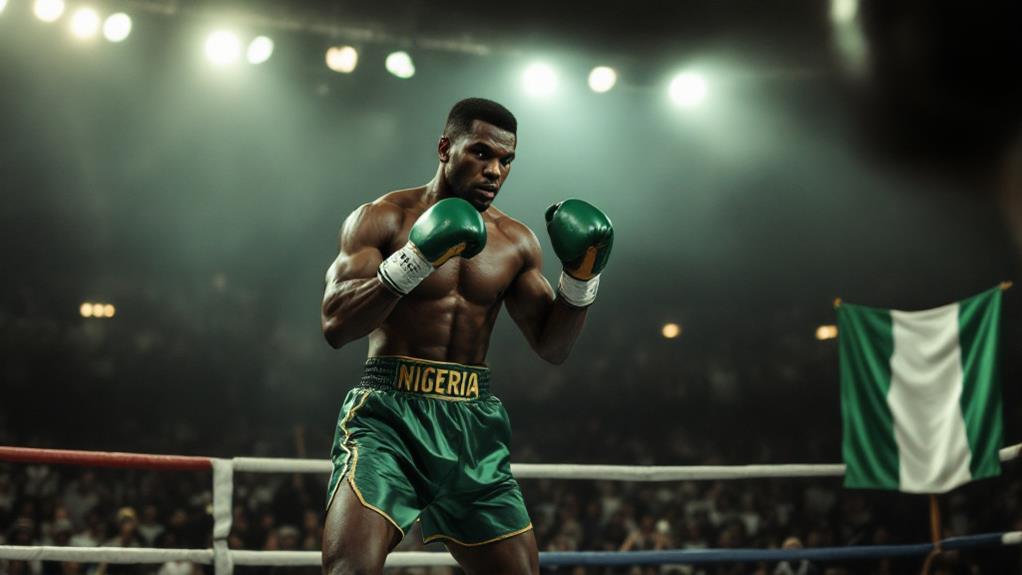
Following his historic World Featherweight Championship victory, Bassey faced the challenging task of defending his title against a roster of formidable opponents. You'll find that his reign as World Featherweight Champion was marked by both triumphs and trials.
In 1958, Bassey successfully defended his title against the legendary Willie Pep, cementing his status as a formidable champion. However, his path to the top wasn't easy. Before clinching the world title, he had to prove himself in a featherweight title eliminator against Miguel Berrios in 1957.
Throughout his championship tenure, Bassey didn't shy away from tough challenges. He faced skilled fighters like Ernesto Parra and Jules Touan in non-title bouts, demonstrating his skill and sportsmanship against various opponents. These fights helped solidify his reputation as a true champion.
Unfortunately, Bassey's reign came to an end in 1959 when he lost the WBA, NBA, and lineal featherweight titles to Davey Moore. Despite this setback, Bassey's impact on boxing history, particularly as Nigeria's first world champion, remains undeniable. His title defenses and challenges showcased his determination and skill in the ring.
Fighting Style and Techniques
Hogan Bassey's fighting style set him apart as a formidable champion in the featherweight division. You'd be hard-pressed to find a boxer with his unique blend of power and finesse. Bassey's powerful punching ability, combined with his technical boxing skills, allowed him to defend his world featherweight title successfully against tough challengers.
What made Bassey so difficult to face in the ring? His excellent footwork and head movement turned him into a moving target, frustrating opponents who couldn't land clean shots. But it wasn't just his defense that impressed; Bassey's jab was considered one of the best in the featherweight division. He'd use it to control the pace and distance of his fights, setting up his devastating combinations.
When Bassey went on the offensive, you'd see his combination punching at its finest. He'd unleash straight right hands followed by rapid-fire left hooks, overwhelming his opponents. His defensive prowess, including his ability to slip punches and counter-punch effectively, rounded out his skill set. This extensive arsenal made Bassey a true expert of the sweet science and a worthy world champion.
Impact on Nigerian Boxing
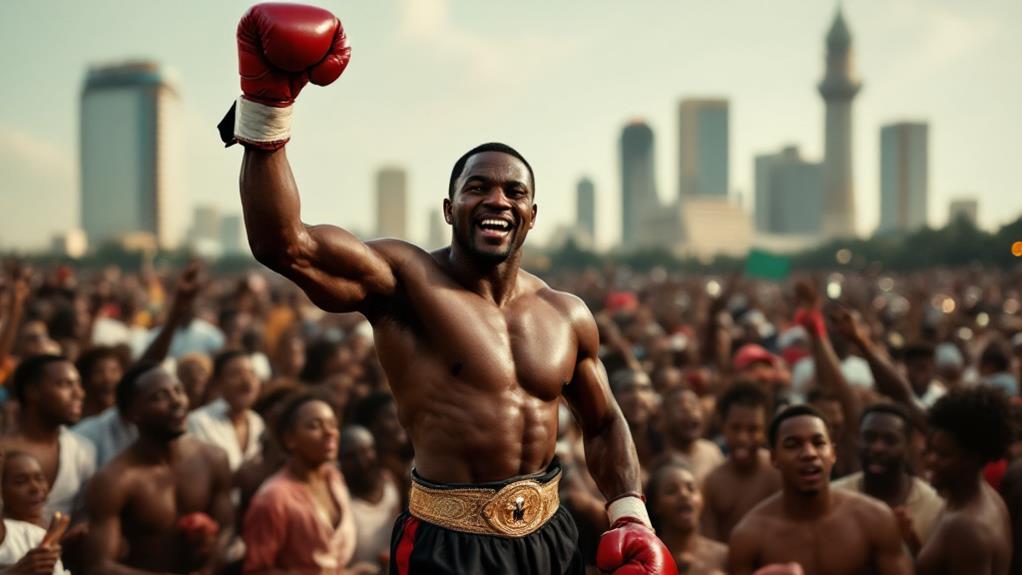
A trailblazer in every sense, Hogan Bassey's impact on Nigerian boxing can't be overstated. As the first Nigerian-British boxer to become a world boxing champion, Bassey paved the way for future generations of Nigerian pugilists. His triumph as the World Featherweight Champion in 1957 ignited a passion for boxing across the nation, inspiring countless young athletes to pursue their dreams in the ring.
Bassey's influence extended far beyond his active career. After retirement, he became a coach in Nigeria, nurturing and mentoring emerging talent. His dedication to the sport and his country earned him the prestigious Order of the British Empire for his services to sport, as well as Nigeria's highest honor, the Order of the Niger.
The born boxer Hogan Kid's legacy continues to shape Nigerian boxing, evoking:
- Esteem for Nigeria's athletic prowess
- Inspiration for aspiring boxers
- A sense of national unity through sport
- Hope for future international success
Bassey's achievements and sportsmanship established him as a role model, influencing the growth and prestige of Nigerian boxing on the global stage for decades to come. His impact echoes today, as Nigeria continues to produce world-class boxers who follow in his footsteps.
Honors and Achievements
Throughout his illustrious career and beyond, Hogan Bassey's exceptional contributions to boxing earned him numerous accolades and honors. In 1959, you'd find Bassey being awarded the Member of the Order of the British Empire (MBE), recognizing his significant impact on the sport. This was followed by Nigeria's highest national decoration, the Order of the Niger (MON), bestowed upon him in 1973.
Bassey's aptitude wasn't limited to the ring. In 1980, he represented Nigeria as a boxing coach at the Olympic Games, sharing his knowledge and experience with the next generation of fighters. His influence on the sport reached its pinnacle in 1992 when he was inducted into the International Boxing Hall of Fame, cementing his status as a true boxing legend.
As a trailblazer and role model, Bassey's pioneering achievements inspired generations of Nigerian and British boxers. His legacy continues to reverberate in the boxing world, reminding us of the impact one individual can have on a sport and a nation. Bassey's honors reflect not only his skill in the ring but also his character and dedication to boxing.
Life After Retirement
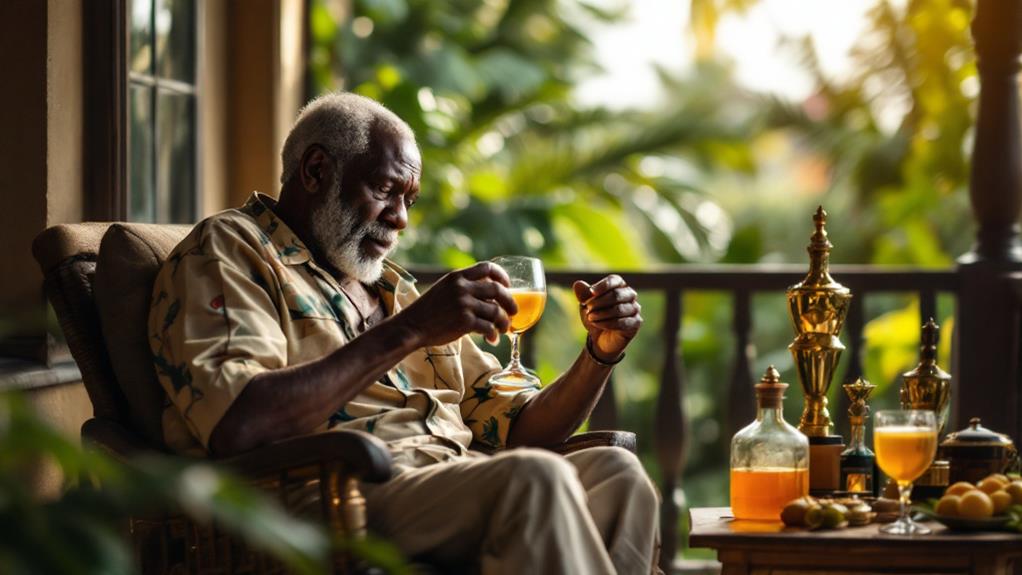
Retirement from the ring didn't slow Hogan Bassey down. After hanging up his gloves, he turned his attention to nurturing Nigeria's boxing talent. As a coach, Bassey dedicated himself to developing the next generation of fighters, passing on his wealth of knowledge and experience.
His contributions to sports in Nigeria didn't go unnoticed. In 1959, Bassey was appointed a Member of the Order of the British Empire (MBE), recognizing his effect on boxing in the Eastern Region. Later, in 1973, he received Nigeria's highest honor, the Order of the Niger, cementing his status as a national hero.
Bassey's role as a mentor and coach left an unforgettable mark on Nigeria's boxing scene. His commitment to the sport and its future champions inspired many:
- He instilled discipline and dedication in young boxers
- He shared his technical expertise and strategic observations
- He provided guidance and support beyond the ring
- He embodied the spirit of perseverance and achievement
Until his death in 1998 at age 65, Bassey remained a revered figure in Nigerian sports. His legacy as the country's first world boxing champion and his tireless efforts to cultivate new talent guarantee that his impact continues to resonate in Nigeria's boxing community.
Legacy and Lasting Influence
Hogan Bassey's legacy extends far beyond his historic 1957 world featherweight title win. As Nigeria's first world champion, Kid Bassey paved the way for future Nigerian boxing stars and inspired generations of athletes across the country. His impact on the sport is undeniable, earning him Nigeria's highest honor, the Order of the Niger, in 1973.
You'll find Bassey's influence deeply ingrained in Nigerian boxing culture. His induction into the International Boxing Hall of Fame in 1992 cemented his status as a trailblazer and one of the greatest Nigerian boxers of all time. Bassey's humble demeanor, technical skills, and sportsmanship earned him widespread respect within the boxing community and among fans.
Even after hanging up his gloves, Bassey continued to shape Nigerian sports. As head coach for the Nigerian boxing team at the 1980 Olympic Games, he passed on his knowledge and experience to the next generation of fighters. Today, you'll see Bassey's influence in every Nigerian boxer who steps into the ring, carrying forward his legacy of determination, skill, and sportsmanship that put Nigerian boxing on the world stage.
